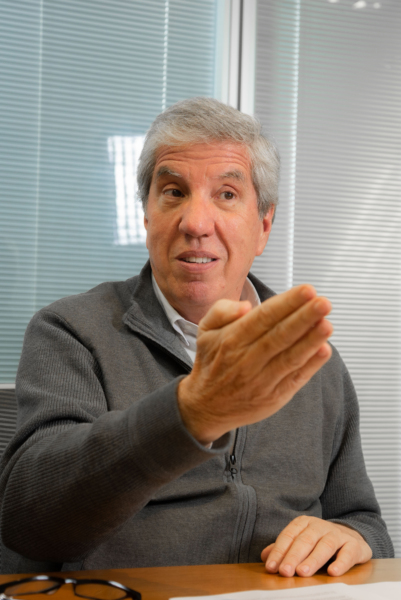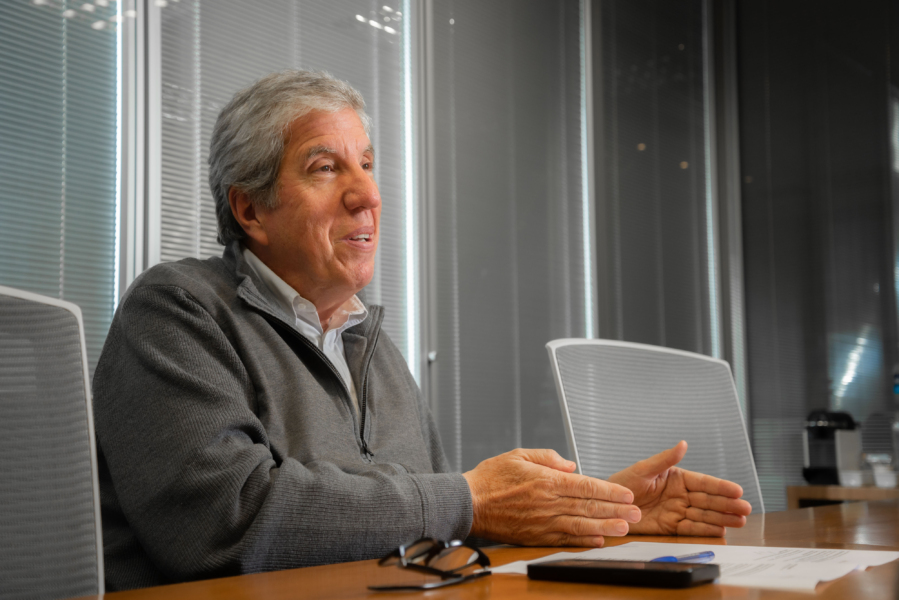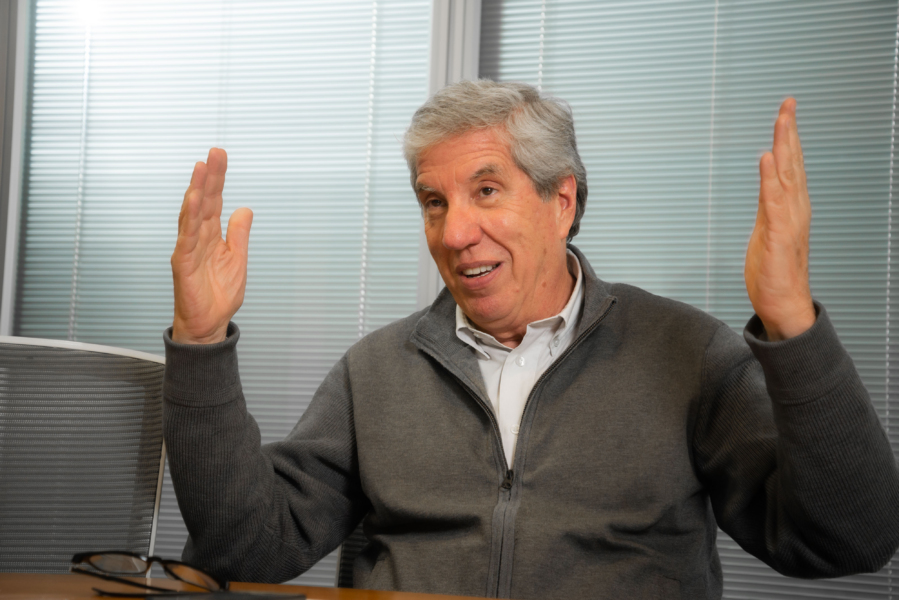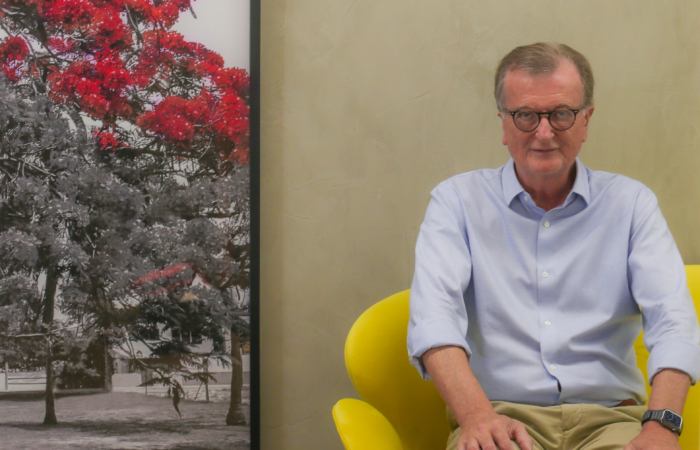
Fábio Coletti Barbosa, one of the most admired business leaders in the country, is in the midst of yet another mission in his career, which includes the presidencies of ABN Amro Real, Santander Brasil, Febraban and Abril Mídia. Since June 2022, he has been in charge of Natura &Co to restructure the company, which has gone through a financial crisis in the last two years.
“The Natura brand is doing very well. No scratched image. In all brand measurements we make with the consumer, it keeps getting better. The scratch has to do with the drop in share prices, it has nothing to do with compromising on values”, he says, when asked about the impact of the financial situation on the company's image, in this interview with Reputation Feed, granted one year after taking over as CEO of Natura &Co.
One of the pioneers and responsible for implementing sustainability practices in the financial system, around 20 years ago, Barbosa assessed that false dilemmas persist among companies in relation to the ESG agenda, which he considers irreversible, strategic and indispensable for organizations that plan longevity. “It's not luxury or passenger, it's a concept of how you have to look to the future”, he says. In this case, he defines, one cannot choose between short and long term. “You have to look at both,” he says. “The CEO's main mission is not to maximize results, it is to perpetuate the company”, he adds.
Versatile executive, member of several corporate and institutional boards, Barbosa has traveled his leadership journey based on what he calls his life purpose: succeeding, doing the right thing and the right way – a personal mark, which he himself recognizes as positive and that he deals with throughout this conversation, permeated by ethics and reputation, held late on a Wednesday afternoon, in his office in Itaim Bibi, in São Paulo.
The main excerpts follow:
You are one of the forerunners of the ESG agenda and established sustainability measures in the financial sector at a time when the acronym did not yet exist. when you had the insight that the themes of sustainability and social responsibility were important?
I never thought about sustainability. I came out of another strand: succeeding, doing the right things, the right way. I started with ethics, not sustainability. I started with the idea that there was a lack of rectitude in a country where people thought a shortcut was needed to get along. Then, the environmental and social issue began, which at the time was called social responsibility.
Did you consider these themes to be part of building your reputation journey?
No. It's in the business strategy. What I want is for us to do things correctly on a daily basis. So if you think about reputation, it never was (for the) my reputation.

Anyway, do you consider this attitude to be an asset for you and the country?
It is an asset for me, for the country. If you ask about me, they'll probably talk about ethics, ESG. Ethics is doing all things right. And I do that in my personal life.
How were you perceived when you innovated with the sustainability agenda in financial institutions in the late 1990s and early 2000s?
This was called social responsibility, then sustainability, and now ESG. When I spoke, I was called a green banker in a mocking tone.

“Look ahead and think about what kind of consumer is coming, these young people who, in five years, will be 15, and, in 10 years, 15-year-olds will now be 25 and 25-year-olds will be 35 years old. They will be consuming more and more. And do you think they consume like my generation consumed? If so, it's going to be out of business right now and selling stuff that people don't want anymore.”
What is your assessment of the ESG agenda in companies today, which is sometimes called into question when the business environment gets more hostile? Is there a backlash? How to implement this agenda in order to meet the demands of the public and the complexities of the business?
I will not endorse your question. It's partially true that companies hold back, as if ESG were a luxury and expensive. For some companies it might be; but, for the most part, it isn't. In fact, the environmental issue, the social issue and transparency in governance do not cost more and do not necessarily mean an investment. There are many false dilemmas. ESG is irreversible. It's generational. If my generation did not leave a better Brazil for our children, it left better children for Brazil. These young people have an environmental, social, ethical and civic conscience that my generation did not have. Well, if that's true, and I see that it is, because I'm observing consumption, it's irreversible. Every day an older person leaves the market who thought that all this was silly and a young person comes in who wants to know about the healthiness of the food, if the company takes care of the issue of CO2 emissions or not, if it has diversity, if it is transparent. It's not luxury or fleeting, it's a concept of how to look to the future. For companies that are just surviving, suddenly it's not worth looking at the day after tomorrow. But for those who understand that the world has a tomorrow, the day after tomorrow, it's good to look at the pattern of consumption and investment.
“If my generation didn't leave a better Brazil for our children, it left better children for Brazil. These young people have an environmental, social, ethical and citizenship conscience that my generation did not have.”
There are good examples of companies implementing sustainable projects based on ESG best practices. Some managers, however, question whether this agenda is worthwhile. How to reconcile short-term goals and investments with long-term ones?
This is the world of 'and' not 'or'. It's silly that either I look at the short term or I look at the long term. You have to look at both. The CEO's main mission is not to maximize the company's results. It means perpetuating the company, which is totally different from maximizing. Sell everything this year and next year I'll see what I do? It's not like this. You need to look at the environment, people. Big companies are very concerned about this. They make commitments (with carbon reduction and greenhouse gas emission strategies extended to suppliers) and, if the supplier is not observing (the environmental issue), the big company will no longer buy from him. Companies that have a vision of perpetuating this business, three, five, 20 years, it's good to do. I participate in sustainability committees of several companies and I see that the banks are not going to finance (companies that do not comply with ESG practices).
Are these changes, which include restrictions on credit to companies and the consumption of products with an environmental impact, the result of pressure from stakeholders, from consumers?
It's not pressure. It's vision. Perceptions are changing. See the example of the plastic straw. It broke who produced and did not pay attention to the change in perception. Society doesn't want plastic. Pressure? No, consumer. And the consumer, fortunately, through their representatives, can turn this into law, into laws that come from the bottom up, which are the best. Look ahead and think about what kind of consumer is coming, these young people who, in five years, will be 15, and, in 10 years, 15-year-olds will now be 25 and 25-year-olds will be 35 years old. They will be consuming more and more. And do you think they consume like my generation consumed? If so, it's going to be off the market right now and selling stuff that people don't want anymore.

How to deal with the hyperconnected customer who influences and is an influencer?
It only changed the form, because the idea of knowing, understanding and pleasing the customer remains the same. The only thing that changes is that the customer today has a voice through the cell phone that they didn't have in the past. Which is why you have to be even more connected and be quick to respond. When I, Fábio, receive a customer question via LinkedIn, I respond right away and forward it.
Should business leaders take a political stand?
Society is the sum of actions and omissions. I think businessmen, as much as possible, should take a stand. Now, you have to be a little careful about who the executive is, because he speaks on behalf of the company and not necessarily the company thinks what he thinks. I don't like the idea that an executive uses the position to express personal views that are not the views of the company, which, in fact, are its shareholders, its employees, its suppliers. (He) he has to know how to balance when he is speaking on behalf of the 20, 10, 5 thousand people he represents, and therefore with legitimacy, and when he is speaking from his opinion, using a circumstantial position. But the answer is yes, he must contribute with his point of view so that society can evolve in its legal and judicial system, in competitiveness, in ESG...
“I don't like the idea of an executive using the position to express personal views that are not the views of the company, which, in fact, are its shareholders, its employees, its suppliers.”
It is common for great executives to make their career transitions by moving from the command of organizations to the board. You recently did the opposite. Last year, he left Natura's board to take over as CEO. Why?
I was on the board of Natura, which, for 'n' market reasons, such as the pandemic, acquisitions and financial cost, began to experience difficulties in its results, having to rethink the pace of growth a little. When the company went through these difficulties, I heard one or two comments in the market stating that Natura thinks a lot about ESG, not much about results. This bothered me, because they were talking about an icon, an expression of my belief, with undue evaluations about what led her to have problems. Natura is an extraordinary company. It is, for me, the reflection of a company that worked, doing the right things, the right way. I accepted (assume CEO position) because it's Natura, because Natura needs to work. (If it were) I wouldn't have done it with another company, because society needs good references from companies that do things with this look at other impacts they cause to society, such as the environmental and social ones. That's the main reason. It's not a long-term plan, but it's a plan to keep this company as a reference. The second reason is that 'I don't let my friends down'. I'm very friendly with the three (Antônio Luiz Seabra, Guilherme Leal and Pedro Passos, Natura partners). They were in need.
And a year later? What's your assessment? When you took over, the company's image was a little damaged, at least in the financial market, with unbalanced finances and a drop in share prices.
The Natura brand is doing very well. No scratched image. In all brand measurements we make with the consumer, it keeps getting better. The scratch you referred to has to do with the drop in stock prices, it has nothing to do with compromising on values. It has to do with acquisitions that were made, perhaps at the wrong time, because Avon was bought in January 2020, and covid started in March 2020. In addition, interest rates rose and there was the war in Ukraine. But we recognize: we have the problem, we will solve it! We are already working on financial rebalancing, with the sale of subsidiaries, and we have been working on strengthening profit margins and cash generation at the units. That's why, the share price this year rose 50%. Once I took over, I had to do a few things. Number one was a restructuring, with the reduction of a holding that sought synergies that were no longer a priority. Number two was the shift in focus from growth to margin and cash generation. The third, rebalancing the financial condition, the capital structure, which led to the sale of Aesop. And, the fourth, working on the development of people so that we have capable and mobilized people. All this within one thing that I admire about Natura: culture.

In today's perspective, would you have done something different in your career and what are the aspects that you consider relevant to highlight?
I'm a good guy with life. I am 68 years old. When I turned 50, I said: if I was given the chance to live again, I wouldn't take it, because of the number of decisions made without knowing exactly where I was going. And that goes for the accidents of life. So, I'm not taking too much credit for myself. I have three things (which he considers important): values, I have never traded any values in search of a shortcut; transparency, I'm super transparent, not having a hidden agenda gives a lot of credibility; and people's ability to mobilize, which is a matter of actually having a project that people think is cool. No one motivates himself to achieve a higher result. People are motivated by doing the right things and by understanding that they are positively impacting society, their own lives. I like to focus on the causes, not the result, which is a consequence. Therefore, it is essential to understand the causes, how things work and what motivates people. There's nothing more fascinating than dealing with people.
What are the three characteristics that the CEO must have today?
“The concept now is inspiration: let's do this, because people mobilize for this. It is the ability to inspire by understanding what motivates them in this world we are living in.”
I will answer in the same way: values, transparency and mobilization capacity. Without the three, it doesn't work. There's no moreon' It is 'Off'. The idea that information is power, command and control belongs to another era. Send who can, obey who has sense is a concept of the past. The concept now is inspiration: let's do this, because people mobilize for this. So, it is the ability to inspire by understanding what motivates them in this world we are living in.
Christianne Schmitt is editor of Reputation Feed
christianne.schmitt@ankreputation.com.br



